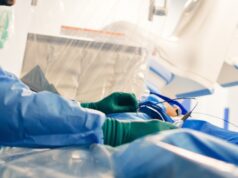
Data presented at the American College of Cardiology annual meeting (9–11 March, San Francisco, USA) indicated that Abbott Vascular’s bioresorbable vascular scaffold Absorb was associated with a major adverse cardiovascular events (MACE) rate of 10% at three years.
According to a company press release, the results are similar to the MACE rate associated with the best-in-class drug-eluting stent at the same follow-up period. The results were from 101 patients in the second stage of the ABSORB trial.
In a subset of 45 patients, the press release reported, state-of-the-art imaging techniques showed improvements in vasomotion and a 7.2% increase in late lumen gain from measurements taken at one and three years. The press release added that these findings are unique to Absorb and are not typically observed with metallic stents that cage the vessel. There was also a decrease in plaque area inside the vessel between one and three years.
“The three-year data reinforce that Absorb may provide unique benefits not possible with metallic stents, including increases in the average area within the blood vessel, reduction in plaque and improved vessel movement over time,” said Patrick W Serruys, professor of interventional cardiology at the Thoraxcentre, Erasmus University Hospital, Rotterdam, the Netherlands. “As the body of data and real-world experience increase for Absorb, we are seeing compelling evidence that a temporary scaffold that dissolves completely after doing its job represents the future of interventional cardiology treatment.”
Also, at a recent PCR meeting in Rotterdam, data were presented from the ABSORB EXTEND study, a single-arm trial evaluating Absorb in patients with more complex heart disease than the ABSORB trial. Data from 450 patients enrolled in this trial showed that the rates of MACE at one year were slightly lower than a comparative set of data with a best-in-class drug eluting stent at the same follow-up period. In an analysis of 119 patients with diabetes from the ABSORB EXTEND trial, rates of MACE were comparable between patients with and without diabetes, a promising finding as event rates are typically higher in patients with diabetes when compared to patients without diabetes.













